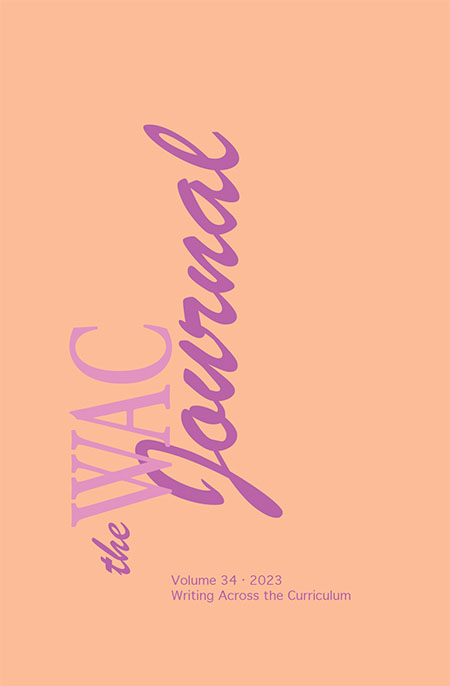- inclusivity, feminist theory, technical and professional communication, writing in the disciplines, social justice, technology, WAC
The WAC Journal has a rich legacy and is the longest-running journal devoted to writing across the curriculum in the field. It is published by Parlor Press, the WAC Clearinghouse, and Clemson University, which is recognized as a national leader in writing and multimedia across the curriculum and digital creativity. The WAC Journal is a “double-anonymous” peer-reviewed journal, published annually. We aim to publish work that explores the multiple theoretical paradigms, diverse approaches, and potential intersections between writing across the curriculum and topics of feminism, technology, and inclusion. We welcome submissions from all WAC scholars.
The WAC Journal endorses the WAC Clearinghouse's "Advice for Reviewers":
We strongly encourage all reviewers to follow these best practices to ensure constructive and collegial feedback to all those who submit their work for publication consideration.
The WAC Journal is available in print and online versions. To obtain a printed volume of the journal, please view our subscription information. To view the online version, please follow the links below.
Volume 34, 2023
Special Issue: Transforming WAC at 50: What, How, and for Whom?
Issue Editor: Cristyn L. Elder
Introduction, Cristyn L. Elder
DOI: 10.37514/WAC-J.2023.34.1.01
Articles
Beyond WAC: Transforming Institutions, Transforming WAC through Deep Change, Caitlin Martin
DOI: 10.37514/WAC-J.2023.34.1.02
A Citation Analysis of The WAC Journal, 1989-2022, Anne Ellen Geller and Neal Lerner
DOI: 10.37514/WAC-J.2023.34.1.03
Toward More Sustainable Antiracist Practices, Sherri Craig, Barclay Barrios, and Jeffrey Galin
DOI: 10.37514/WAC-J.2023.34.1.04
(Re)Defining WAC to Guide a Linguistic Justice Ideological Change Across Campuses, Emily Bouza
DOI: 10.37514/WAC-J.2023.34.1.05
Languaging Across the Curriculum: Why WAC Needs CLA (and Vice Versa), Shawna Shapiro
DOI: 10.37514/WAC-J.2023.34.1.06
Race, Writing, and Research: Leveraging WAC to Reduce Disparities in Research Funding and Publication, Joanna Johnson
DOI: 10.37514/WAC-J.2023.34.1.07
“The Total Pattern of the World”: Misinformation across the Curriculum (MAC) and the Next Fifty Years of Higher Education, Paul Cook
DOI: 10.37514/WAC-J.2023.34.1.08
The Future of WAC Is Multimodal and Transfer-Supporting, Crystal N. Fodrey
DOI: 10.37514/WAC-J.2023.34.1.09
Potential of WAC in Graduate Writing Support: Helping Faculty Improve Systems of Graduate Writing, Mandy Olejnik
DOI: 10.37514/WAC-J.2023.34.1.10
The State and Future of WAC Faculty Development Scholarship: A Citation Analysis of Publications, 2012–2022, Christopher Basgier
DOI: 10.37514/WAC-J.2023.34.1.11
Mapping the Present to Shape the Future: An Interactive, Inclusive e-Map Supporting Diverse WAC Practices and Writing Sites, Kendon Kurzer, Greer Murphy, Robyn Russo, and Katherine Daily O’Meara
DOI: 10.37514/WAC-J.2023.34.1.12
Back Issues
Volume 33, 2022
Volume 32, 2021
Volume 31, 2020
Volume 30, 2019
Volume 29, 2018
Volume 28, Fall 2017
Volume 27, Fall 2016
Volume 26, Fall 2015
Volume 25, Fall 2014
Volume 24, Fall 2013
Volume 23, November 2012
Volume 22, November 2011
Volume 21, November 2010
Volume 20, November 2009
Volume 19, August 2008
Volume 18, September 2007
Volume 17, September 2006
Volume 16, September 2005
Volume 15, September 2004
Volume 14, August 2003
Volume 13, June 2002
Volume 12, May 2001: WAC and General Education
Volume 11, April 2000
Volume 10, April 1999: Using Writing to Enhance the First-Year Experience
Volume 9, August 1998
Volume 8, August 1997: Retrospective Issue
Volume 7, August 1996
Volume 6, August 1995
Volume 5, May 1994
Volume 4, April 1993
Volume 3, 1991-1992
Volume 2, August 1990
Volume 1, June 1989

 Open the entire volume
Open the entire volume